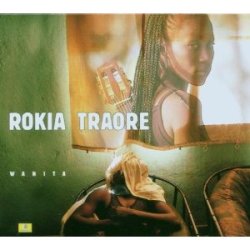Rokia Traore – Wanita (2000)
Rokia Traore – Wanita (2000)

1. Kanan Neni 2. Mouso Niyalen 3. Souba play 4. Yere Uolo 5. N'Gotolen 6. Wanita 7. Chateau De Sable 8. Yaafa N'Ma 9. Sako Be Ke play 10. Mancipera 11. Tchwa Personnel: Rokia Traore (vocals, acoustic guitar, percussion); Boubacar Traore (vocals); Louis Winsberg (guitar); Toumani Diabate (kora); Adama Diarra (balafon); Abdul Wahab Berthe, Noel Ekwabi (bass); Sidiki Camara (percussion).
Wanita is a mild quantum leap from Traoré's debut, Mouneïssa. The style she cultivated on her debut -- a glorious mix of the singer/songwriter with the rootsy, acoustic instruments of her native Mali -- is refined here, and she approaches everything with more confidence. She's very much a rarity in African terms, a female singer/songwriter, and one whose lyrics are very progressive, dealing with the rights of women in a patriarchal society. But she's representative of a new generation that has brought forth a lot of professional women, for whom she's become a figurehead. She lauds hard work, her people, and the freedom to love. Her own acoustic guitar work might be relatively simple, but the arrangements of her band fill out the sound wonderfully, especially the large, xylophone-like balafon and the n'goni, a kind of lute. By keeping this very Malian, Traoré ensures her music remains quite authentic, and speaks to her own people, rather than any sellout to Western values. At the same time, it's very appealing and rich on its own terms, her lulling voice a far cry from the stridency of many Malian female Wassoulou singers, something Western ears can accept quite readily -- a kind of African Joni Mitchell, but with a more acute social conscience. Hers is a talent that's beginning to find full bloom with this record, fulfilling the promise of her earlier disc, and proving that the ground she broke before is a very fertile furrow indeed. Wanita establishes her at the head of a genre, not merely by virtue of doing it first, but by the sheer talent as a writer and singer which she brings to it. ~ Chris Nickson, canada.mymusic.com
When Rokia Traore turned to non-Malian vocal styles on Wanita, she didn't opt for an obvious Western approach like fellow West African diva Angelique Kidjo, who steeps her songs in funk. Instead, Traore's multilayered singing has the delicate complexity of Zap Mama alumnus Sally Nyolo's Tribu plus the gentility of chamber music. Instrumentation hews to the traditional arsenal of her country's griot troubadours, though with a modern edge. Rokia contributes acoustic guitar to a solid ensemble of balafon marimba, ngoni ba four-string guitar, djemba hand drum, electric bass, and kora harp from whirlwind Toumani Diabate. "Souba," based none too obviously on an Indian raga, shows her willingness to stretch boundaries in unexpected directions while the title track lingers on lush harmonies seldom heard in African pop. The hushed atmosphere of her performances may lack the raw soulfulness of Mali's best-known female vocalist, Oumou Sangare, but Traore's melodic hooks and quiet acrobatics prove the truth of the old adage that a whisper can be more dramatic than a shout. ---Bob Tarte.
Rokia Traore is an impressively talented young vocalist and songwriter from Mali. From the sound of this disc, she has her feet firmly rooted in the traditional music of her homeland, but the other subtle influences heard here indicate that she is not afraid to gently expand her musical horizons.
There is a delicate beauty at work here -- the arrangements are uncluttered (acoustic guitar, balafon, bass, kora and assorted percussives) and unadorned, leaving the vocals clear and unburied. The songs all have vital rhythmic cores, but without the over-produced power-pounding of commercial dance-oriented music.
The kora (an indigenous African harp-like instrument) is allowed to dominate many of the arrangements -- and its delicate sound is a good choice to complement Traore's expressive and unpretentious voice. It is the unforced, compelling emotion in her voice that demands our attention. The recording is first-rate and clear as a bell -- every little nuance of Traore and the other singers is there for us to appreciate.
Released under the Indigo imprint from Label Bleu out of France, the package is exceptionally attracive as well -- a quality-printed, oversixed booklet fits nicely inside the cardstock slipcase along with the cd jewelbox, filled with beautiful photographs, a bio of the artist and lyrics in original and translated forms.
There is an airy quality to this music, but it is powerful at the same time -- proving that louder isn't always better. The talent and production values brought together here make for a musical excursion of exceptional quality, taste and strength. I'll definitely keep my eyes -- and ears -- open for more from this gifted artist. ---Larry L. Looney, amazon.com
download (mp3 @320 kbs):
yandex mediafire zalivalka cloudmailru ge.tt
Zmieniony (Niedziela, 25 Czerwiec 2017 18:45)








